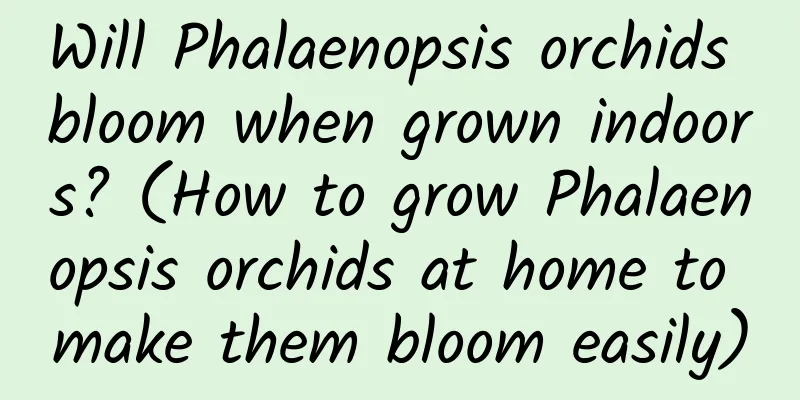Is it true that the orchid has grown crystal heads? (The phenomenon of orchids adapting to the pot after one month of being potted)

|
A flower lover asked : If an orchid has a crystal head, does it mean that it is still alive? Does it mean that the planted orchid has adapted to the pot? To determine whether an orchid is adapting to the pot, the most important point is to see whether its roots have newly sprouted crystal heads. From this picture we can see: The 1st circle position is the crystal head of the orchid. We call the soft tissue with strong vitality at the root tip of the orchid the crystal head. The presence of the crystal head is a guarantee that the orchid has acclimatized. The 2nd circle position is the orchid roots that are rotten and empty. It is recommended to trim the roots after repotting. The orchid is in good condition overall as can be seen from the 3rd circle , so there is no need to worry. It can be seen from the 4th circle that some roots have completely rotted, but it does not affect the acclimatization. This problem is caused by the normal shedding of orchids. I think the 5th circle position is a new bud, but this position should have the tendency to be an underwater bud, which means that the root system was not well expanded when the netizen put it in the pot. Undersea buds are difficult to grow, so I suggest removing them. From your description, "many crystal heads were found" in the orchid pot, which means that your orchid has adapted to the pot and started to grow and develop. After one year in the pot, if the orchid is properly cared for, it has basically adapted to the pot. The sign that the orchid has adapted to the pot is the growth of new roots. In fact, after being potted, the orchid will go through several stages. Orchids will have normal weeding when they are potted, then sprout, and then start to grow leaves and roots. The speed of acclimatization has a lot to do with the seedling condition, maintenance method, and environment. For orchid novices, they often think that the seedlings are alive when they sprout, which is often a false alive phenomenon. Improving the survival rate of orchids planted in potsIn fact, what we usually say: "whether the orchid is acclimatized after being potted" refers to: "the survival rate of the orchid after being potted" . The survival rate of newly potted orchids is closely related to factors such as the potting season, maintenance environment, planting materials and maintenance methods. Generally speaking, orchids planted in pots in April and May have a higher survival rate. Planting them too early will easily cause frost damage; planting them too late will cause the temperature to be too high, and the roots will often rot, affecting the orchid's growth. October is also a good time to plant orchids in pots. Three points to note when planting orchids in potsAs the saying goes: "Three parts of orchid cultivation are planting, and seven parts are maintenance." For newly potted orchids, the planting materials, maintenance environment, and management methods are all very important. You should pay attention to the following three aspects: (1) Water thoroughly to allow roots to formFor newly potted orchids, the first watering should be completed within 6 to 48 hours, and be sure to water thoroughly so that every part of the planting material in the orchid pot is moistened. This is commonly known as orchid "rooting water." Orchid lovers should be reminded that when watering the roots, do not mix fertilizers, otherwise it will easily cause root rot and seedling damage. Not only will it be difficult for the orchid to grow in the pot, but it may also cause seedling death. (2) "Nurture" after pottingFor orchids that have just been potted, the main focus should be on "nutrition", and avoid applying any fertilizers or hormones. Generally, it is recommended not to apply fertilizer within 2 months. After 2 months, if the root system is good, 1~2 times of thin fertilizer can be applied, but it is better to use light and thin fertilizer liquid. For orchids with poor root system, it is not suitable to use fertilizer for 3~6 months, and thin fertilizer can be applied after half a year. (3) Maintenance in shaded areasFor orchids that have just been planted in pots, the roots and the surrounding planting materials have not yet formed the best supply and demand relationship. The orchid roots have a very low absorption rate of water and nutrients in the planting materials. If the orchid pot is placed in the sun at this time, it will easily cause the orchid to lose water. Therefore, it should be placed in a cool, ventilated place with diffuse light for maintenance for about 20 to 30 days; but for orchids with well-developed root systems and strong growth, the shade period can be appropriately reduced. |
>>: Do microbial agents have a rooting effect (promoting the growth of crop plant roots)?
Recommend
When is the right time to sow greenhouse watermelons?
Suitable time for planting greenhouse watermelon ...
The meaning of roses, the price of roses
1. Meaning 1. Red roses: Roses are usually used t...
Indoor Clivia blooms 3 or 4 times a year, with thick leaves and strong roots. How does it do that?
1. Daily maintenance (Author: Orchids of Plum, Or...
Flowering period of Xanthoceras sorbifolia
1. Flowering period The normal flowering period o...
How to fertilize bamboo orchid
1. Fertilization time During the growth period of...
Does Amaryllis prefer a large or small pot? What kind of pot is suitable?
When choosing a pot for growing Amaryllis, it is ...
Do azaleas like the sun?
Azalea likes the sun Azalea likes sunlight. It is...
What kind of flowers are better to grow in the bedroom in winter? These flowers sterilize and remove dust!
1. Chlorophytum comosum Many people should know a...
When is the best time to plant ryegrass (seasonal time and method for planting ryegrass)
As our animal husbandry continues to grow and dev...
How to propagate Magnolia grandiflora by grafting
Preparation before grafting Magnolia grandiflora ...
Can bougainvillea be planted in the ground?
Can bougainvillea be planted in the ground? Bouga...
When is the best time to plant cherry seeds?
Cherry seed planting time Cherry is a perennial p...
What is the best month to plant yacon?
When to plant yacon Yacon is usually planted in s...
Cultivation Techniques of Big Cherry Bonsai
How to make big cherry bonsai 1. Seedling selecti...
Characteristics of Peony Flowers
1. Appearance characteristics Peony is known as t...









